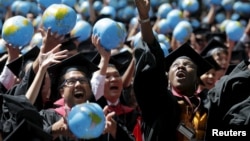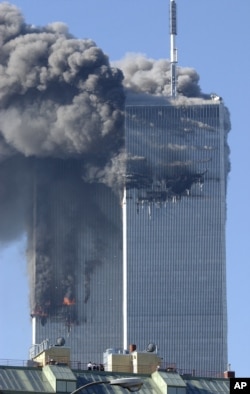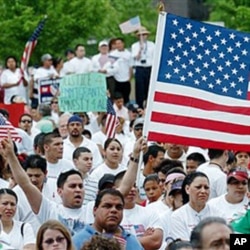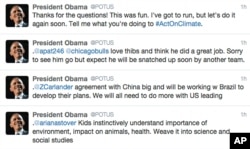Move over, baby boomers: Millennials now outnumber you as America’s largest living generation.
And their very different views of themselves and their place in the world will likely reshape U.S. foreign policy for decades to come.
Baby boomers, born between 1946 and 1965, came of age during a period of unprecedented American prosperity – and peril: The omnipresent nuclear threat created in boomers a sense of unease and uncertainty that made the world seem a very threatening place, experts say.
Millennials, roughly defined as those born between the early 1980s and early 2000s, came of age after the Cold War and, therefore, see the world as less menacing despite 9/11 and the rise of global terrorism.
Sense of danger
“It’s not to say that they don’t appreciate danger,” said Trevor Thrall, an associate professor at George Mason University and co-author of a recent CATO Institute white paper on Millennials and foreign policy. “It’s just that compared to the danger that older people feel, it’s just markedly less.”
Thrall said he wasn’t surprised to learn that Millennials were not more affected by 9/11 than they appear to have been. Most were too young to understand events at the time, and their understanding of the attacks is based on how the discussion on terror has evolved since that time.
“Older people think, ‘We’re a great people, we got attacked by these crazy people, and now we are dealing with it and we have to be careful,’ ” Thrall said. “Millennials are the only generation the majority of which think the U.S. must have done something to provoke 9/11.”
His finding is based in part on a 2011 Pew Research poll that found 52 percent of 18- to 29-year-olds in the U.S. believed U.S. actions might have motivated the 9/11 attacks.
Changing world view
Indeed, millennials take a dim view of American exceptionalism.
A Pew poll in 2011 found that only a 32 percent of them perceive the United States as superior to other countries, as compared to 64 percent of boomers.
The study also found that although most millennials say they are patriotic, they express that patriotism far less fervently than older Americans.
Millennials also showed that being patriotic does not mean they are uncomfortable criticizing government policies nor do they believe in an aggressive foreign policy.
“But they are very strong on human rights, and although they are more resistant to using military force around the world to solve problems, one way in which they are the most likely to be moved by arguments to use force is humanitarian intervention," Thrall said.
"They are actually a little bit more supportive in most polls of humanitarian military intervention than older folks," he added.
His study also shows that millennials view Asia, not Europe, as the most important region of the world, and China will figure strongly in U.S. foreign policy and perhaps push it in a less adversarial direction.
This, he said, could work out well, if the Chinese are similarly inclined.
It could fail, however, if millennials are misreading Beijing’s intentions.
In general, Thrall predicts millennials will steer the U.S toward a more restrained “grand strategy” that relies less on unilateral force than on cooperative ventures.
The 'Thumb Tribe'
Back in 2002, a researcher at Britain’s Warwick University noted that youngsters’ thumbs had evolved to become more dexterous than their other fingers due to their constant use of hand-held electronics.
Today, technology may be the single greatest factor shaping the “thumbers' ” – now millennials’ – world view.
They are less likely to read newspapers because they find all the information they want online – even if they aren’t consciously looking for it.
“Even if they are playing online, the amount of information that they are consuming and are exposed to, it’s probably difficult for them to have a large online presence and not be exposed to some perspective on key foreign policy issues,” said Jarrel “J.P.” Price, president of Young Professionals in Foreign Policy, a nonpartisan group looking to groom the next generation of foreign-policy leaders and promote international relationships.
“Technology also makes it easier for a millennial sitting at home in the United States to reach out and build a personal relationship with someone overseas,” Price said.
"And to the extent that is used well by our generation, then I think the global partnerships that we could see could be transformative," he said.
Census information
Census data show another important factor contributing to millennials’ global view: More than 44 percent of them belong to a minority race or ethnic group.
Price and Thrall both pointed out that millennials are not just the largest generation in the United States, but the largest in many regions of strategic interest to the U.S.
Telecommunications giant Viacom estimates the global millennial population to be 2.5 billion, though this figure is higher than other estimates.
Millennials account for about a quarter of the European Union’s population, according to Pew findings. And in the Middle East, they account for 40 percent of the population and are powering dramatic change from Tunisia to the Gulf States.
“Their critical periods of between the ages of 14 and 24 have been chock-a-block full of horrendous events that will shape their views for a lifetime,” Thrall said, “and many of those have some serious negative connotations for the United States.”
Thrall points out that Arab youths’ view of the U.S. is so “horrible” right now that American millennials are going to be dealing with the fallout for the rest of their lives.
'Defining features'
“How American millennials respond to that is going to be one of the defining features of American foreign policy for the next fifty years,” Thrall said.
Thrall said it’s too soon to say whether millennials are having an impact on U.S. foreign policy.
But Price said he can see already see their fingerprint on foreign affairs.
“We see a rise in things like digital diplomacy, which the United States is eager to catch up with some of our world partners on,” he said.
“Tools like Facebook and Twitter are used not just by individuals to affect global events, as we saw with the Arab Spring, but in how governments are communicating with their constituents on foreign policy and how governments are trying to highlight and explain their decision making through the use of technology – to reach predominantly millennials," Thrall said.
None of this is to suggest that millennials all share the same viewpoints.
“There are just as many big differences among Millennials as there are with any generation,” Thrall said.
His study shows millennials are just as divided on core issues as their elders and that we can expect just as much debate over policy in coming years as we see today.
Thrall’s study shows millennials, like boomers, are divided between political camps.
However, despite their differences, Republican and Democratic millennials agree on the importance of firm policy to help prevent nuclear weapons proliferation, combat terror and reduce U.S. reliance on oil.
Implications for 2016
He may not be the right age, but at least one observer suggested that President Barack Obama could be considered the first American “millennial president” – not only for his ability to connect with millennials electronically but for his policy of nonintervention in Syria and Iraq and his pursuit of a nuclear agreement with Iran.
“I certainly think every candidate considering a run or already running knows the importance of the millennial generation and is trying to replicate President Obama’s success in connecting with them,” Price said.
Price predicts that foreign policy matters will figure more highly in the runup to the 2016 presidential vote than in previous elections and anyone wanting to get into the White House is going to have to know how to connect with millennials on their level.
Does he see anyone in the current pool of announced candidates who has that ability?
Price only laughs, saying: “I’ll probably have to take a pass on that.”
















